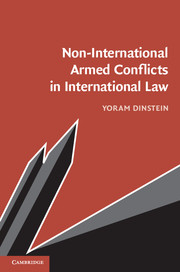Book contents
- Frontmatter
- Contents
- Preface
- Table of cases
- Table of treaties
- Table of Security Council resolutions
- Table of General Assembly resolutions
- Abbreviations
- 1 The framework
- 2 The preconditions of a NIAC
- 3 Thresholds and interaction of armed conflicts
- 4 Insurgent armed groups and individuals
- 5 Foreign intervention in a NIAC
- 6 Recognition
- 7 State responsibility
- 8 The principal LONIAC treaty provisions
- 9 Additional treaty texts
- 10 NIAC war crimes
- 11 LONIAC customary international law
- 12 LONIAC and human rights law
- Conclusions
- Index of persons
- Index of subjects
Conclusions
Published online by Cambridge University Press: 05 September 2014
- Frontmatter
- Contents
- Preface
- Table of cases
- Table of treaties
- Table of Security Council resolutions
- Table of General Assembly resolutions
- Abbreviations
- 1 The framework
- 2 The preconditions of a NIAC
- 3 Thresholds and interaction of armed conflicts
- 4 Insurgent armed groups and individuals
- 5 Foreign intervention in a NIAC
- 6 Recognition
- 7 State responsibility
- 8 The principal LONIAC treaty provisions
- 9 Additional treaty texts
- 10 NIAC war crimes
- 11 LONIAC customary international law
- 12 LONIAC and human rights law
- Conclusions
- Index of persons
- Index of subjects
Summary
NIACs have to be examined not only from the vantage point of LONIAC. Issues of foreign intervention, recognition and State responsibility connected to NIACs have always commanded attention, and modern realities have only given them a keener edge. Whether or not the Security Council determines that NIACs constitute threats to international peace, civil strife presents a clear and present danger to world stability.
Having said that, a preoccupation with LONIAC is nowadays central to any serious discussion of NIACs. The swift upsurge of LONIAC – within the span of a single generation – from a non-subject in international law to a rich lode of both customary and treaty law (including an array of war crimes) is astounding. The process provides lambent evidence that international law is capable of unexpected velocity when the exigencies of a changing world demand it.
The compass point in the direction of which LONIAC seems to be accelerating is IAC jus in bello. As a result, legions of scholars advocate full integration of NIAC and IAC law of armed conflict. But despite the growing convergence between these two branches of the law, the notion of their amalgamation is purely academic and quite implausible. There is a fundamental divergence barring such merger, and State practice does not divulge the slightest inclination to outflank it any time soon.
- Type
- Chapter
- Information
- Non-International Armed Conflicts in International Law , pp. 246 - 248Publisher: Cambridge University PressPrint publication year: 2014



